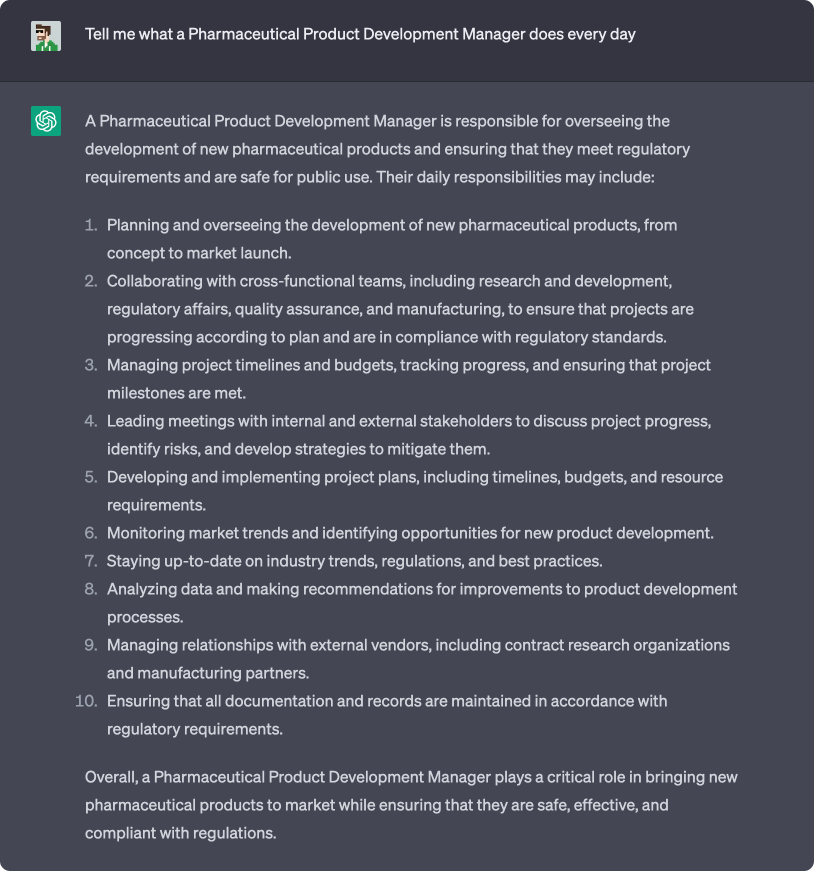
ChatGPT, Your Biased UX Research Assistant
If you're like me, your probably wondering to what extent ChatGPT is coming for your job. And at the same exact time, wondering how you can utilize it to get ahead. So how useful is an NLP like Open AI's ChatGPT to a UX designer or UX researcher?
(As this a fast-evolving technology, please keep in mind the time this was posted.)
UX Abilities 🤖
- First and foremost, ChatGPT works with super speed. It gives you results faster than you can read. So in a world where interviews or workshops could be scheduled weeks away, this speed is alluring.

- ChatGPT can create detailed personas. This could help you quickly get up to speed with an unfamiliar industry. You can control how much, or how little depth you'd like. You can add things like a generated name, pain points, motivations, personality and even use an AI-generated persona photo.

- Research an organization's firmographics and understand a competitive analysis.
- Build customer journeys in an overview or in fine detail. Ask questions as if you're talking to an SME and dive deeper and deeper into detail.
- Take that journey you just made and watch ChatGPT's creative storytelling abilities as you throw in persona details, situations, and different writing tones and lengths. This is an awesome time saver!

- If you have resources to utilize the ChatGPT APIs, you could analyze your quantitative and qualitative research to surface patterns. This is helpful because you can increase testing volume to help see past bias and catch common patterns.
- Summarize and tag interview transcripts to glean insights. ChatGPT is very good at summarization and tagging. A lot of third-party services charge for such abilities, but now these impressive AI tools are in your hands!

A few UX Limitations ⚠️
- Most versions of ChatGPT aren't yet trained using up-to-date datasets. Most data comes before 2021… This limits the information you may be looking for.
- Feeding proprietary or PPI directly is not totally secure. Check with your legal and management teams before using this technology. There are some workarounds to get ChatGPT to communicate with your private data without actually sending your data. But you will need resources to utilize the APIs.
- It's known that ChatGPT can have a bias in its responses. It's also known to give inaccurate answers or to try and guess. The lesser known, the less available a topic is, the less you should bet on ChatGPT's accuracy. Or sometimes the exact opposite. If a topic is widely debated, sometimes ChatGPT will pick a side. ChatGPT shines best with ideas that are commonly known and widely agreeable.
- Product feedback can be heavily influenced by its own marketing's perception and not the actual user's perspective. I've witnessed this firsthand when looking for user research.
- Tools like ChatGPT lack fresh, rich insights and genuine human empathy toward your own living, breathing users.
Conclusion 🤔
Will ChatGPT take my UX job? No, it's not able to do that yet. That said, ChatGPT is a great generative and researching tool that can help you move faster. Since creating my account, I've been using it just about every workday.

Here is what I've found are the best uses for ChatGPT in UX Research and Design
- Getting up to speed on industries and their personas
- Assist in building up your list of assumptions (to test)
- Creating security-safe demo data over lorem ipsum for higher fidelity mockups and user testing
- Bringing a user journey to life using storytelling
I like to think of ChatGPT as Wikipedia-quality research (without the sources listed at the bottom…). Sounds terrifying right? ChatGPT can't even provide the resources it used to train itself! If you ask it to do so, it will just provide some similar web search results (Similar to asking questions from Google or Siri).
ChatGPT's assumptions do not substitute for real user research. Plain and simple.
Do you trust this AI as a subject matter expert? Chat GPT most likely does not have access to your customers! Your customer's issues are constantly changing. Your users are not a generic conglomerate of the past. You will miss out on the unique pain points and opportunities your users have today! Even with this new tool, you will still need to conduct interviews on the regular. ChatGPT may help answer a few of your initial questions, but it will most likely become a new threat toward genuine user empathy.
**None of this writing was generated using GPT 🤞
But how will you know for sure? (Farewell Medium.com…)


 Up next
Your Product Team Needs a Research Repository
Up next
Your Product Team Needs a Research Repository



